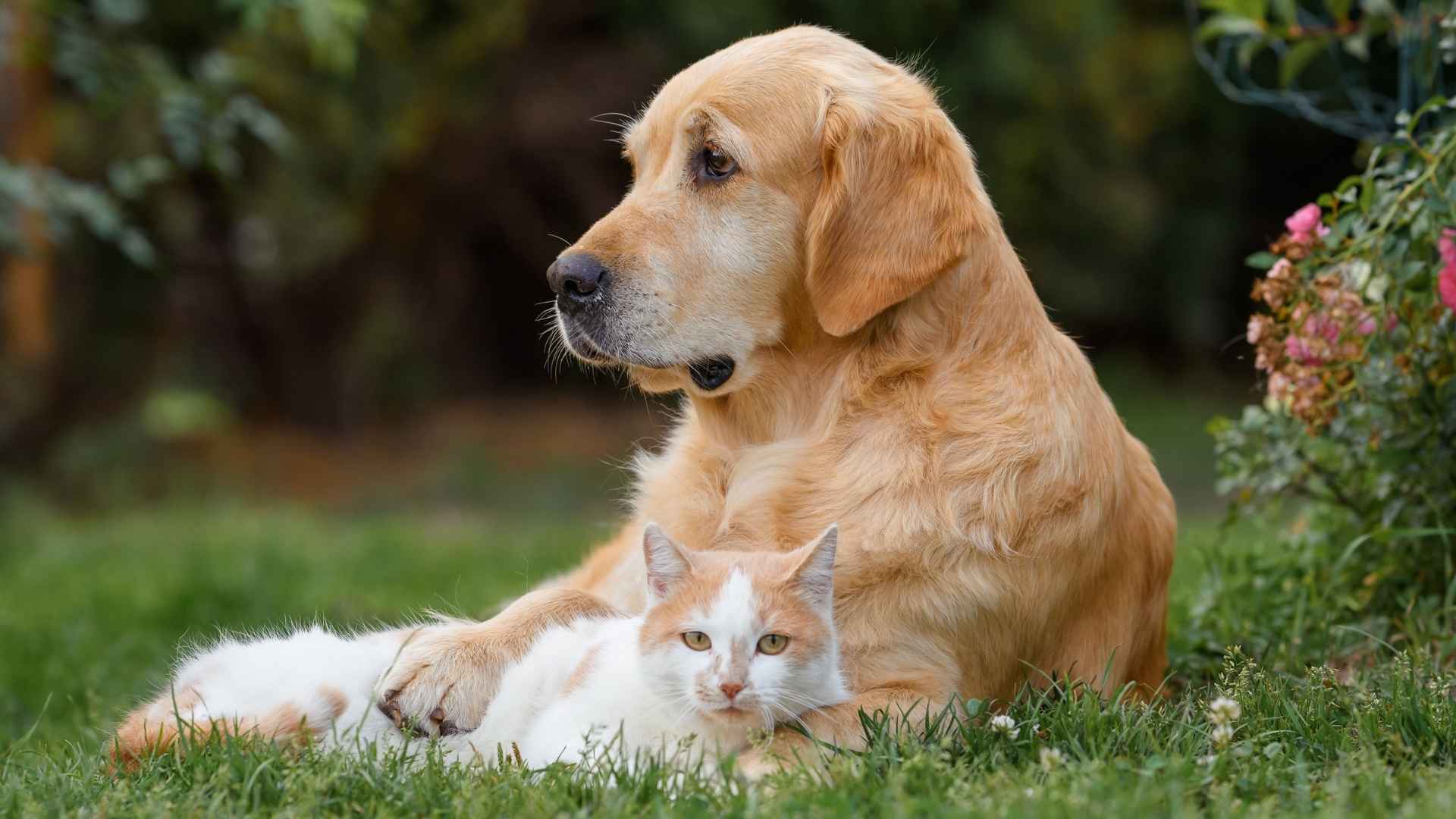Ever thought about getting a guard dog but worried about how they’d get along with your other pets? You’re not alone! A lot of people assume that protective breeds are all about toughness and territory, but guess what? Some can be fearless protectors and gentle companions—if you pick the right one.
The trick is finding a breed with a natural balance between loyalty and social adaptability. While they’re wired to guard, some breeds are surprisingly patient with smaller pets and even enjoy their company. The key? Proper training, early socialization, and understanding of their temperament.
A well-trained guard dog won’t just protect your home—they’ll also be a loving part of your pet family. So, stick around if you’re looking for a four-legged protector that won’t terrorize your cat or turn every walk into a showdown. We’re diving into the best guard dog breeds that are great with other pets!
Guard Dog Breeds Good with Other Pets
1. Great Dane
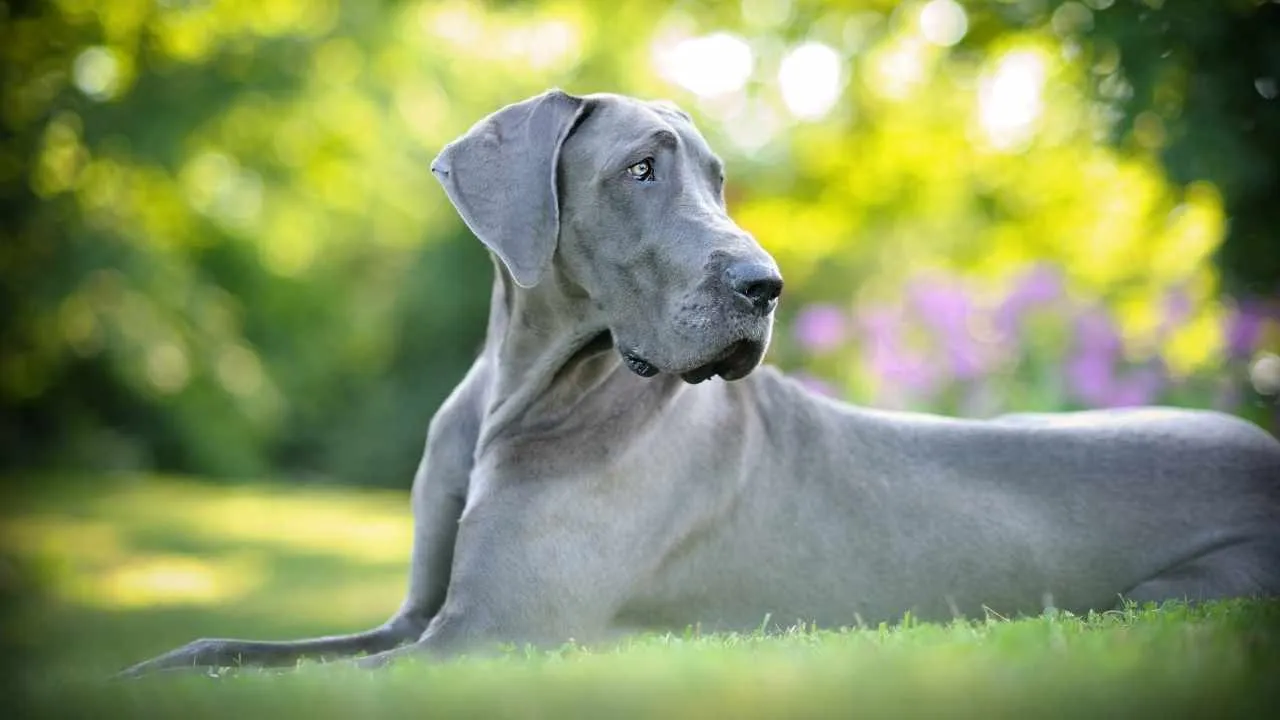
The Great Dane is a towering protector with a heart as big as its size. These gentle giants have a natural instinct to guard their family, but their affectionate personality makes them surprisingly good with other pets. Despite their imposing build, they’re known for being patient, especially with smaller animals—though their sheer size might accidentally knock over a tiny friend!
One of the biggest perks of owning a Great Dane is their keen sense of awareness. They don’t bark excessively, but when they do, it’s for a reason. Intruders? You bet they’ll stand their ground. But around their pet siblings, they’re soft and tolerant, often lounging around with cats or smaller dogs like they own the place.
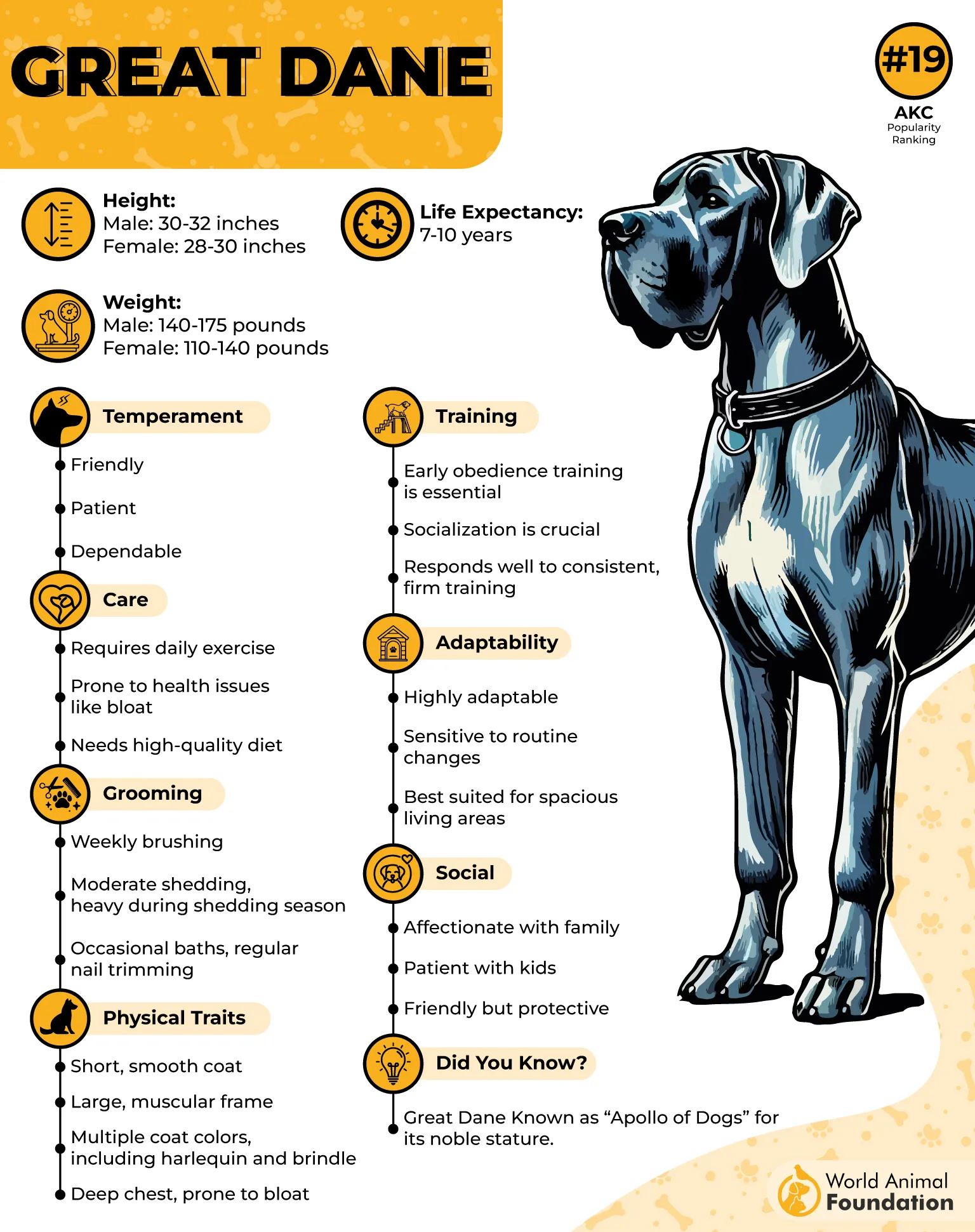
Socialization is key with this breed. The sooner they learn to coexist with other pets, the better they adapt. Their intelligence makes training a breeze, and once they know their furry housemates aren’t a threat, they form deep, protective bonds. You might even catch them acting as a “bodyguard” for a tiny kitten or a nervous pup. Great Danes are sociable, friendly, and eager to please, states the AKC.
Ever seen a dog that thinks it’s a lapdog but weighs over 100 pounds? That’s a Great Dane for you! They love being close to their humans, often snuggling up without realizing just how massive they are. Their calm nature means they won’t lash out at smaller animals, though they might accidentally sit on one!
Unlike some high-energy guard dogs, Great Danes don’t have an intense prey drive, which makes them less likely to chase small pets. However, their sheer enthusiasm might make tiny critters nervous at first. Slow introductions and supervised interactions help ensure a smooth friendship.
Fun Fact: Great Danes are total couch potatoes despite their huge size! If given the choice between standing guard or snoozing on the sofa, they’ll likely choose the latter—until duty calls.
2. German Shepherd
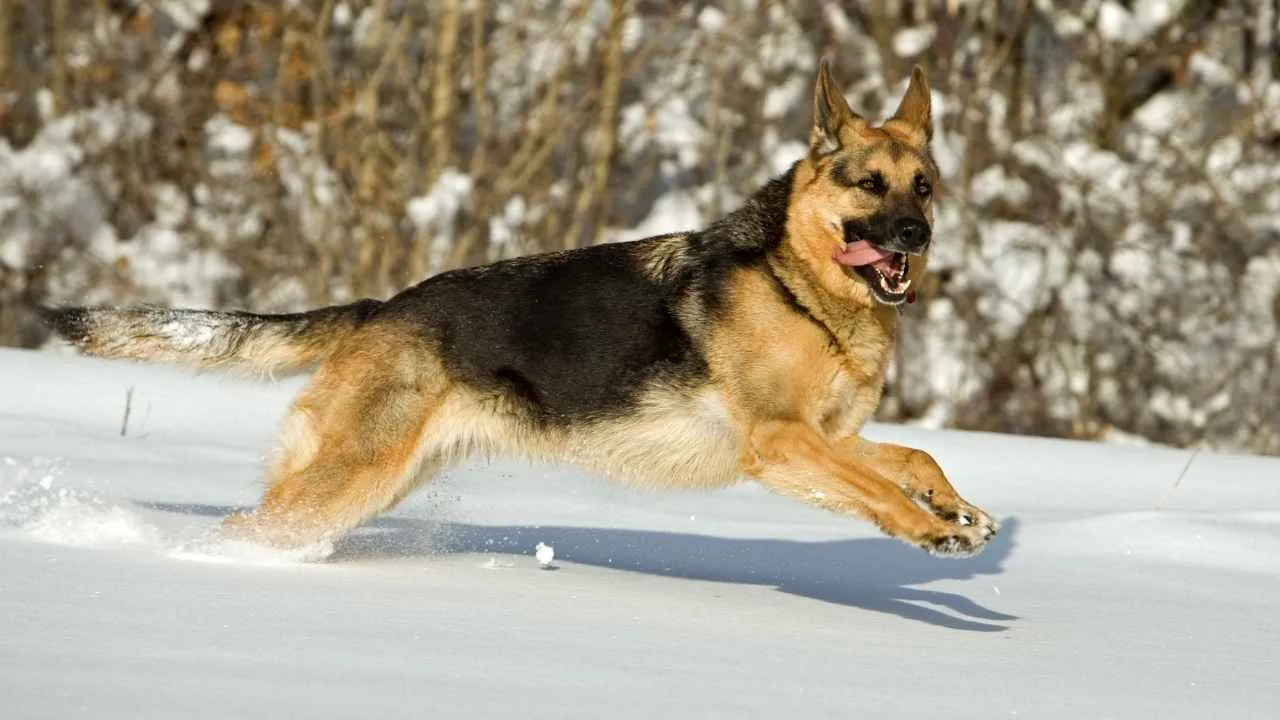
Meet the German Shepherd—a breed known for its intelligence, loyalty, devotion, and protective instincts. While they’re often associated with police and military work, they’re just as capable of being gentle, well-mannered members of a multi-pet household. Their sharp minds make them quick learners, so they can be trained to respect and live peacefully with other pets.
Once they recognize a fellow pet as part of the “pack,” they become incredibly protective of them. Whether it’s a cat, a rabbit, or another dog, they’ll keep a watchful eye, ensuring everyone stays safe. However, their herding background means they might try to “organize” smaller pets, so early training is key!
Unlike some aloof guard dogs, German Shepherds are highly active companions, says PetMD. They don’t just tolerate other pets—they can genuinely enjoy their presence. With proper introductions, they often develop a playful and nurturing side, especially toward younger animals.

What sets them apart as guard dogs is their ability to assess situations. They don’t just react; they think. This makes them fantastic protectors who won’t lash out unnecessarily. Instead of being aggressive toward other pets, a well-trained German Shepherd will watch over them with quiet confidence, stepping in only when needed.
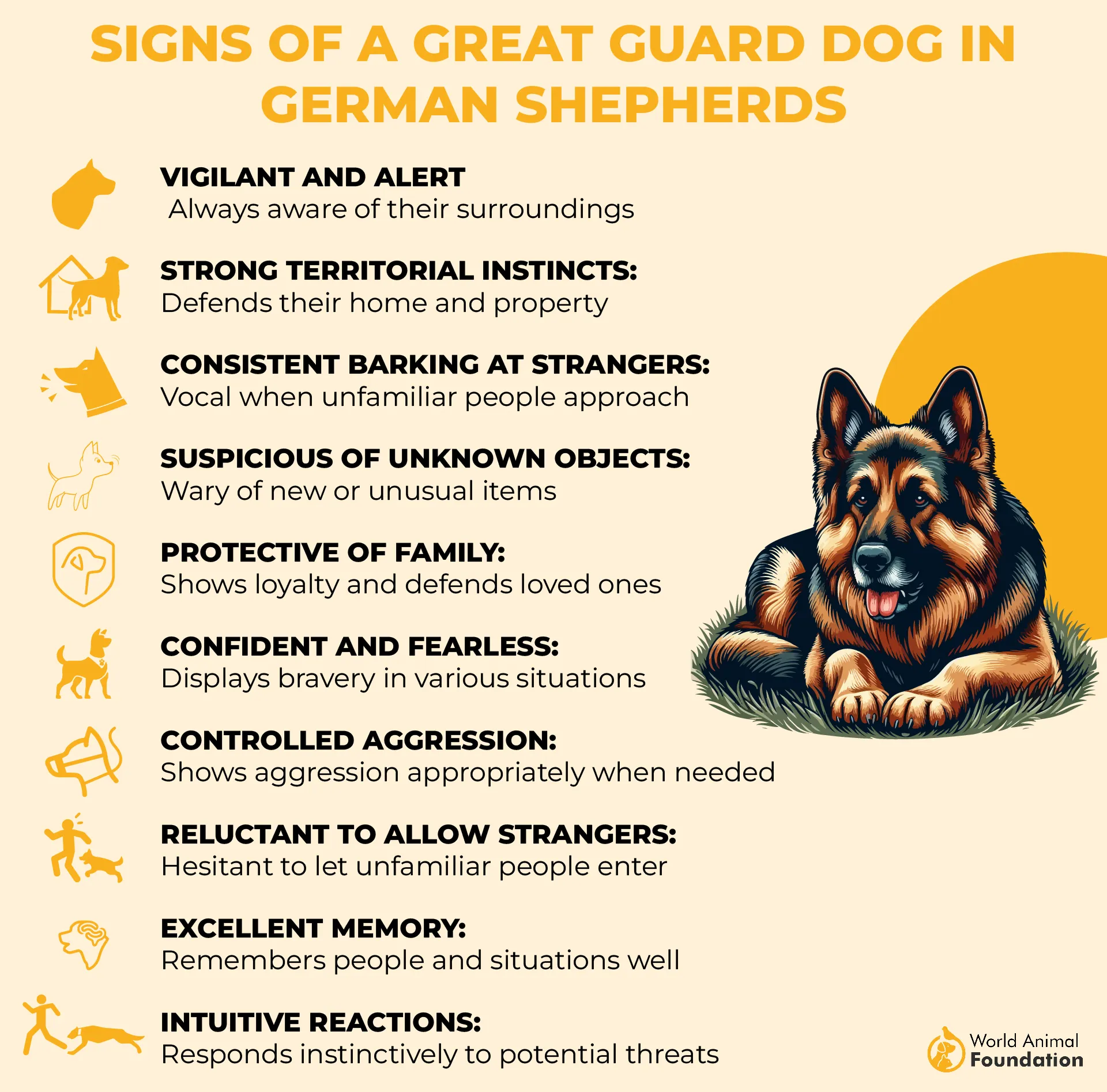
Training is a must with this breed. Without it, their strong instincts can lead to dominance over smaller or more timid pets. But with the right guidance, they become reliable, obedient, and gentle giants in the household. Could there be a better combo than a fearless guardian and a caring best friend?
3. Bernese Mountain Dog
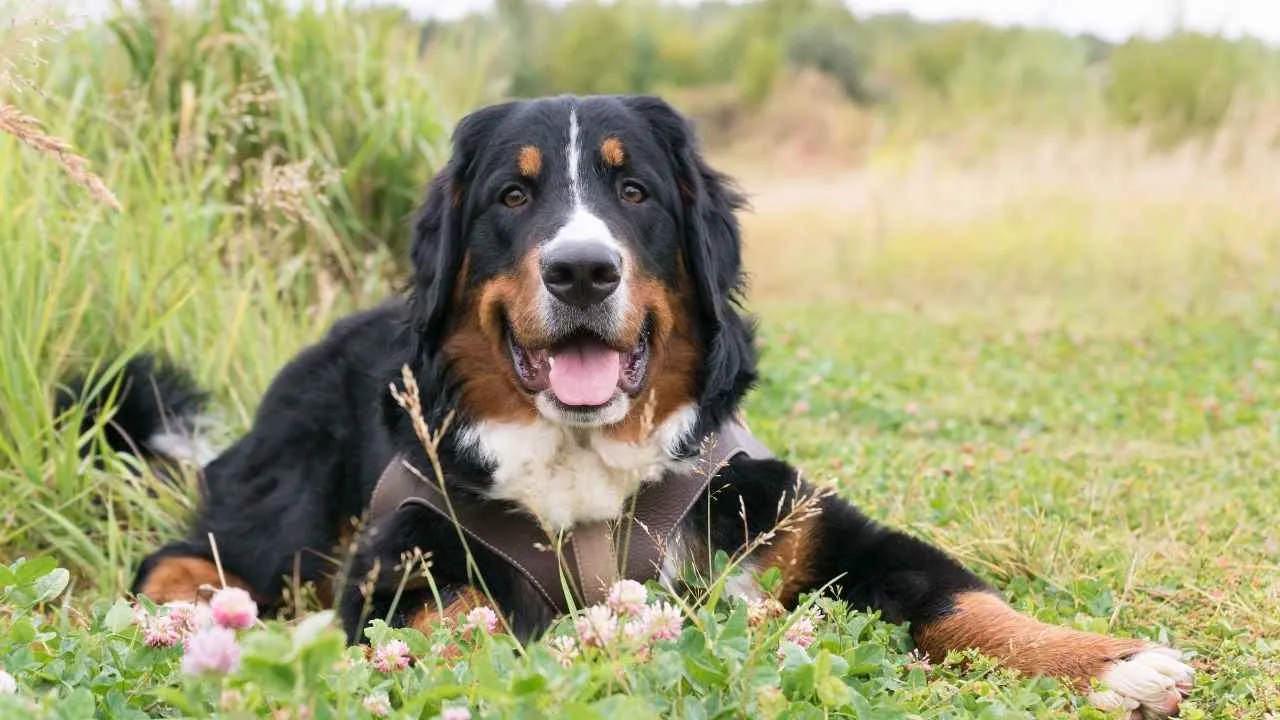
Bernese Mountain Dog is a gentle giant rather than a fierce protector. While they have strong protective instincts, they’re not aggressive—just deeply devoted to their family. This includes humans and other pets. Their calm, affectionate nature makes them one of the best guard dog breeds for multi-pet households.
Bernese Mountain Dogs are naturally tolerant, so they aren’t easily irritated by smaller, more energetic pets. Whether it’s a hyperactive puppy or a mischievous cat, they have the temperament to handle it. They’re gentle giants who prefer peace over conflict but will step up if their family is in danger.
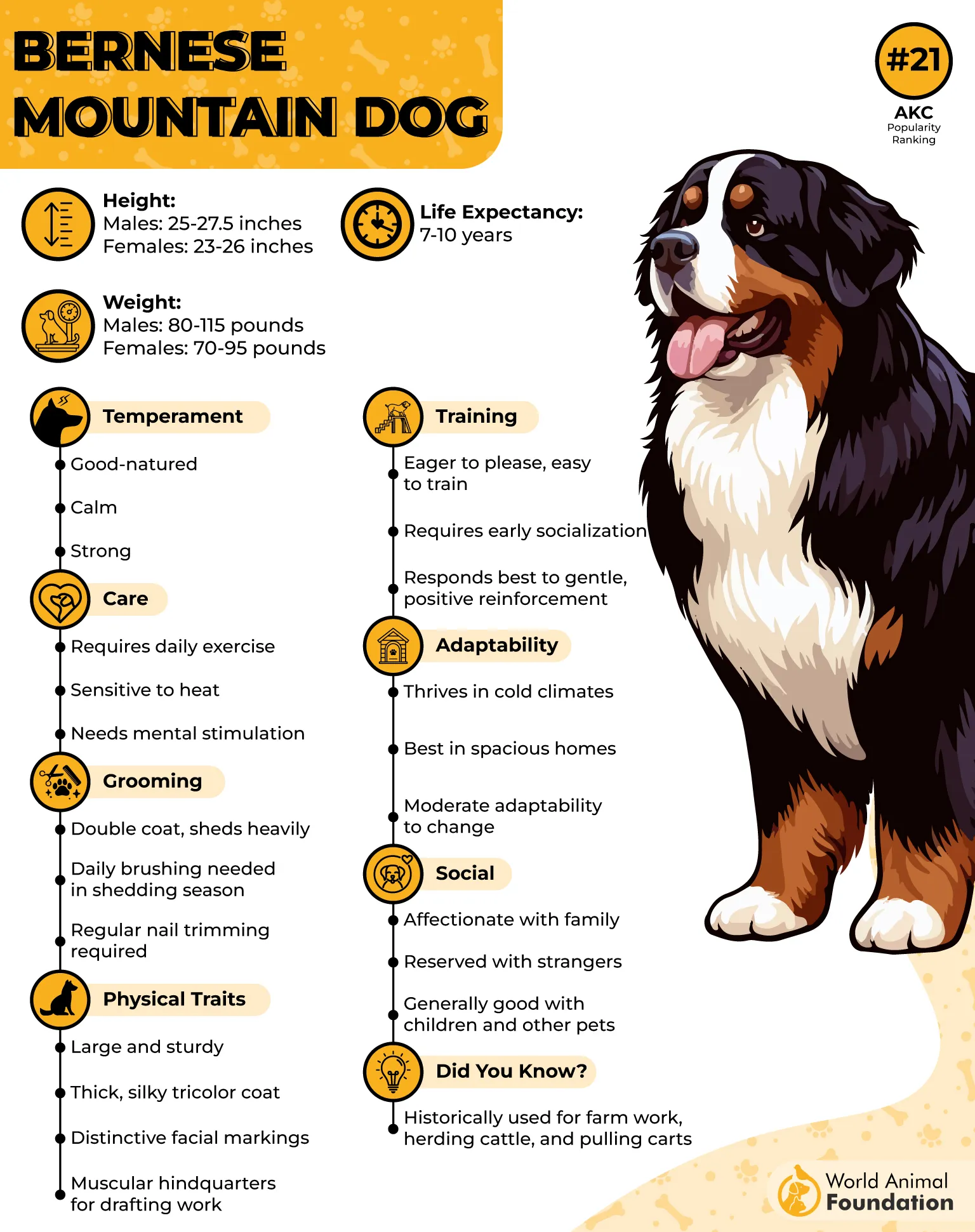
Despite their large size, Bernese Mountain Dogs aren’t overly dominant. Unlike some breeds that may try to assert control over smaller pets, they’re naturally easygoing. Their protective nature is more about watchfulness than intimidation. Instead of aggressively scaring off threats, they rely on their imposing size and deep bark to do the job.
Exercise and mental stimulation are key to keeping them balanced. While they enjoy lounging with their pet siblings, they also need regular activity to stay happy and well-behaved. Without it, they can become overly clingy or even develop separation anxiety.
One thing to remember is their thick, double, fluffy coat, states the AKC. They love being outdoors, so they might drag in dirt and mud—something cats and smaller pets might not appreciate. Regular grooming keeps them comfortable and ensures they don’t unintentionally smother their tiny friends with all that fur.
4. Airedale Terrier
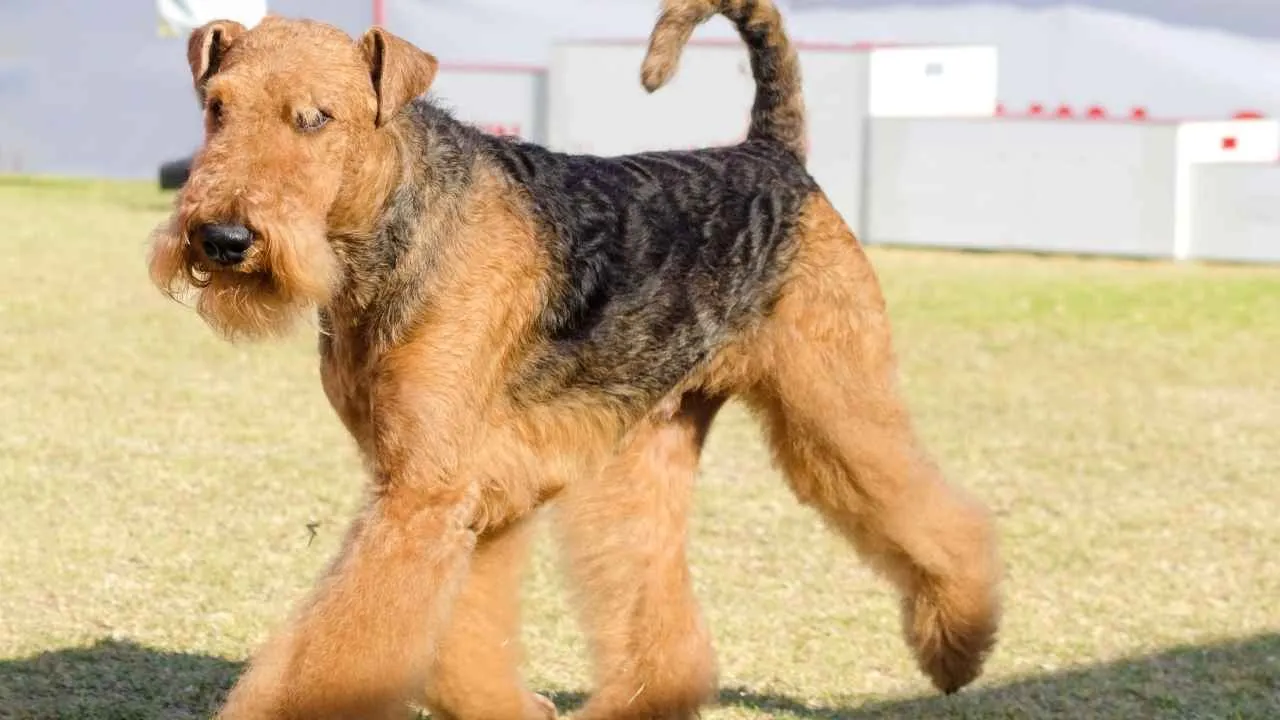
The Airedale Terrier, known as the “King of Terriers,” proves that courage and intelligence matter just as much as size. These dogs are fiercely loyal, highly alert, and naturally protective, but what makes them unique is their adaptability in multi-pet households. They have a social, playful streak that helps them coexist with other animals, if introduced properly.
Airedales enjoy having a playmate with their fellow pets. Their boundless energy makes them fantastic companions for other active dogs, and their curiosity keeps them engaged with smaller pets, like cats or even birds. Of course, their terrier instincts mean early introductions, and training is key to preventing unwanted chasing behavior.
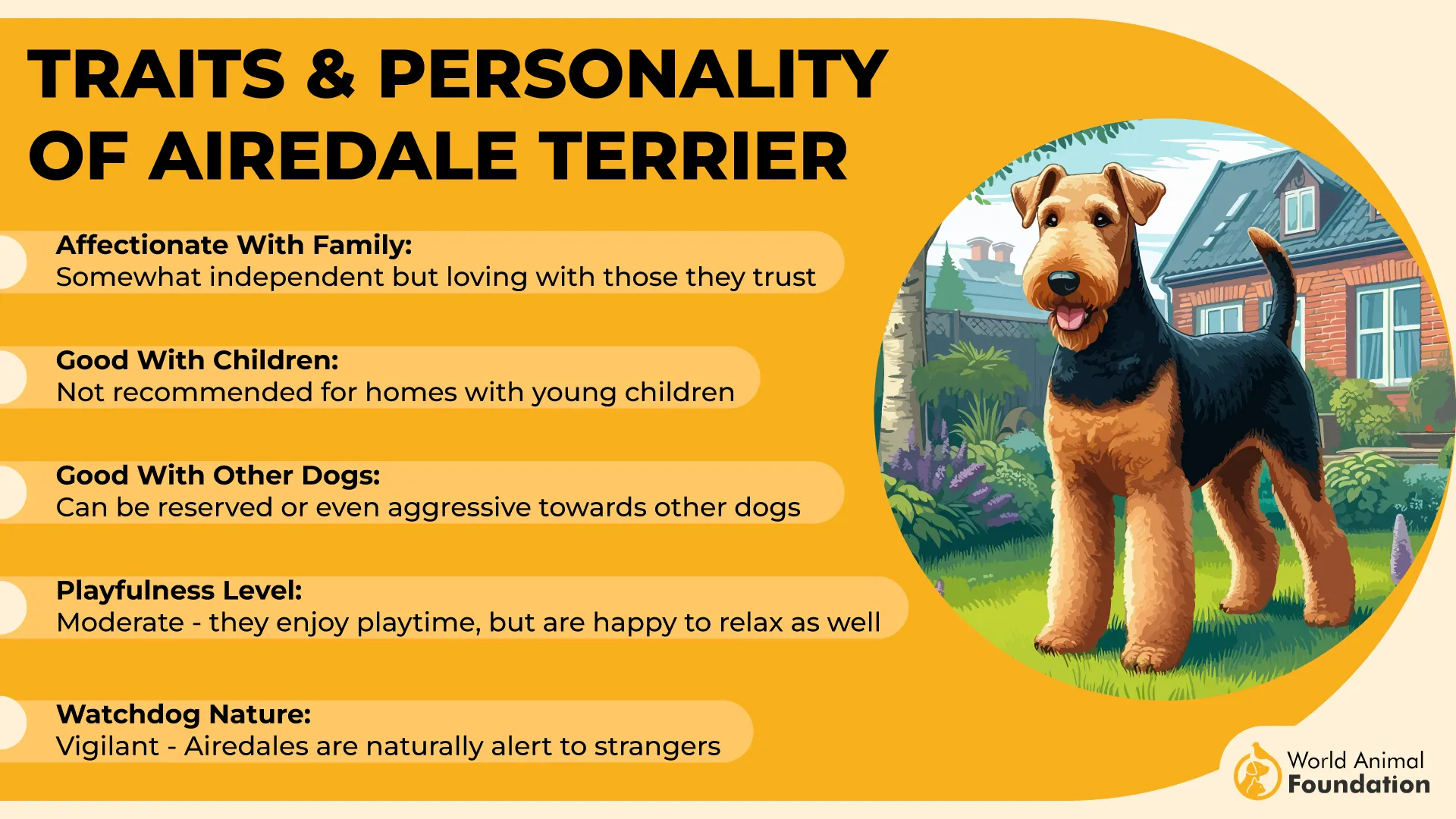
One thing’s for sure—Airedales are always watching. Airedale Terriers are smart, jolly, and loyal dogs, states PetMD. They have a sharp, intelligent gaze that constantly scans their surroundings. If they sense anything unusual, they’ll alert you right away. But instead of being overly aggressive, they rely on their confidence and strong presence to ward off potential threats.
What’s their secret to getting along with other pets? Their love for structure. Airedales thrive on routine and training, which helps them understand boundaries in a multi-pet household. If they’re raised alongside other animals and taught the right behaviors from an early age, they grow into respectful and well-mannered companions.
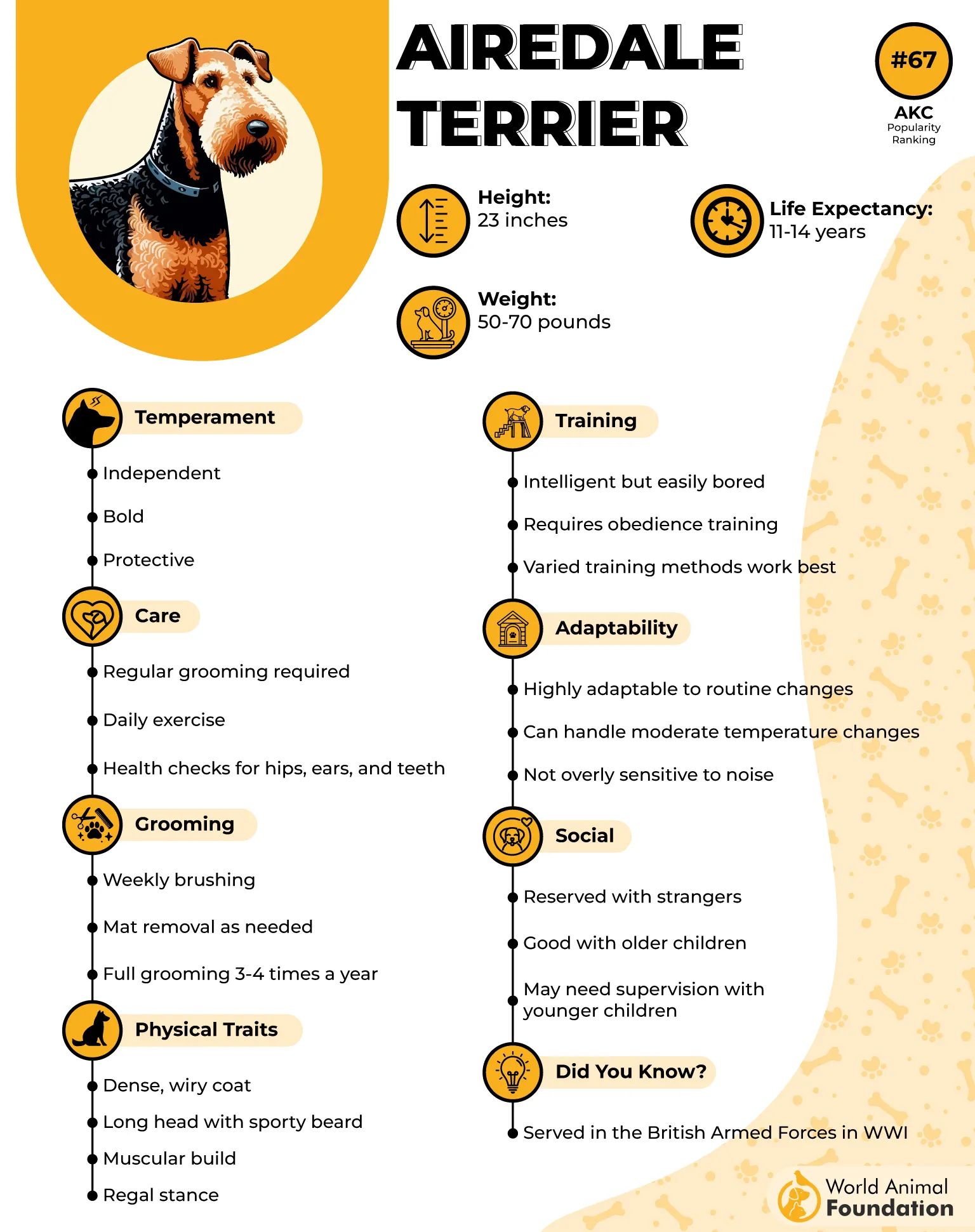
They also have a strong sense of independence. While they bond deeply with their family, they aren’t clingy or overly dominant toward other pets. They respect confident animals but may try to “boss around” timid ones. However, with firm leadership and socialization, they learn to coexist peacefully.
5. Tibetan Mastiff
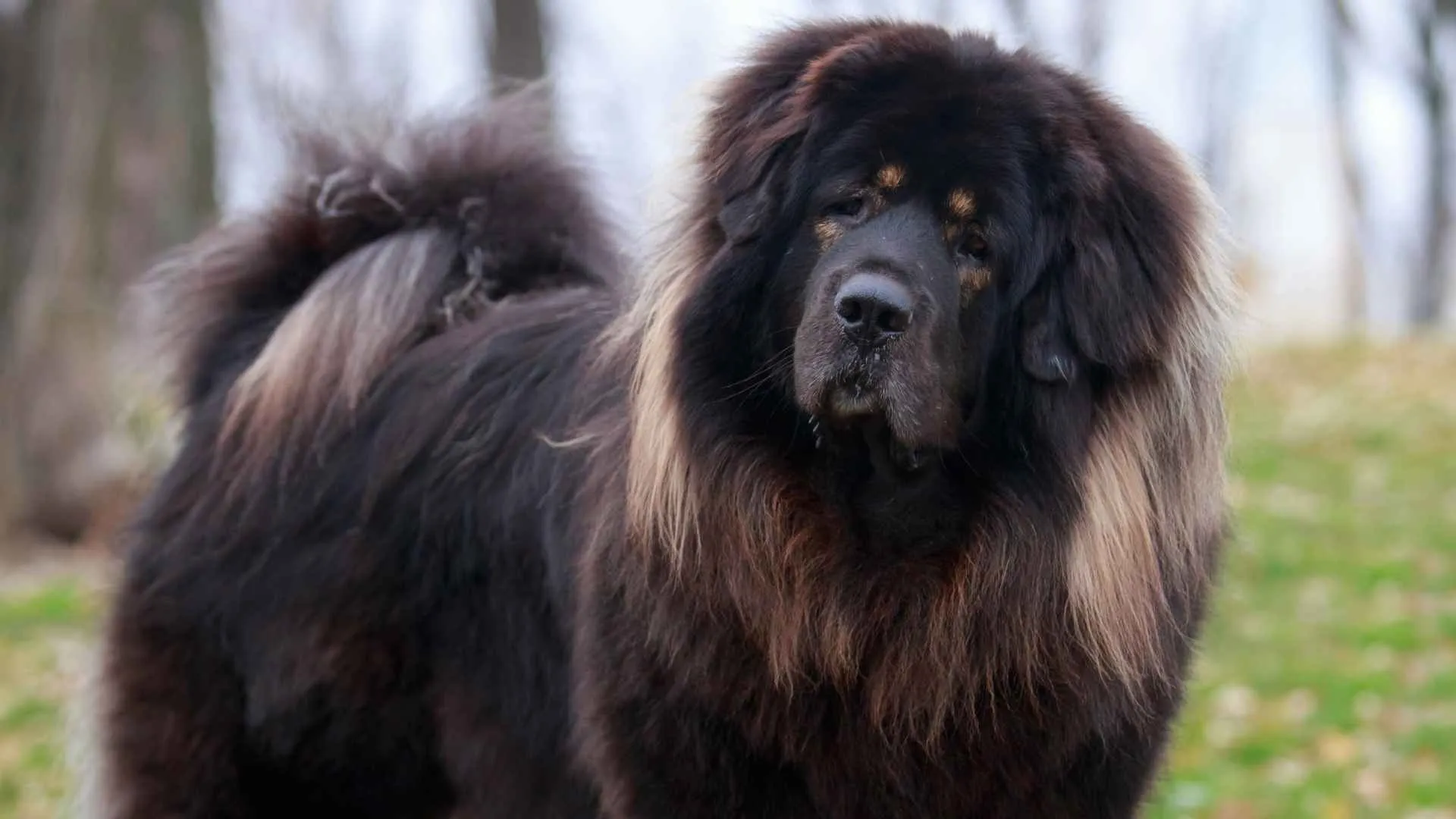
Ever wanted a guard dog that looks like a lion but has the heart of a gentle guardian? Meet the Tibetan Mastiff, a powerhouse protector wrapped in a thick, fluffy coat. Originally bred to guard livestock in the harsh Himalayan terrain, this breed takes security seriously. According to Purina, they can be surprisingly affectionate with their family, including other pets!
Tibetan Mastiffs don’t just bark at intruders; they think before they act. They’re not impulsive or overly aggressive but rather calculated and observant. This makes them fantastic guardians who know when to stand down and when to step up. Around smaller pets, they’re more patient than you’d expect, often treating them like part of their pack.
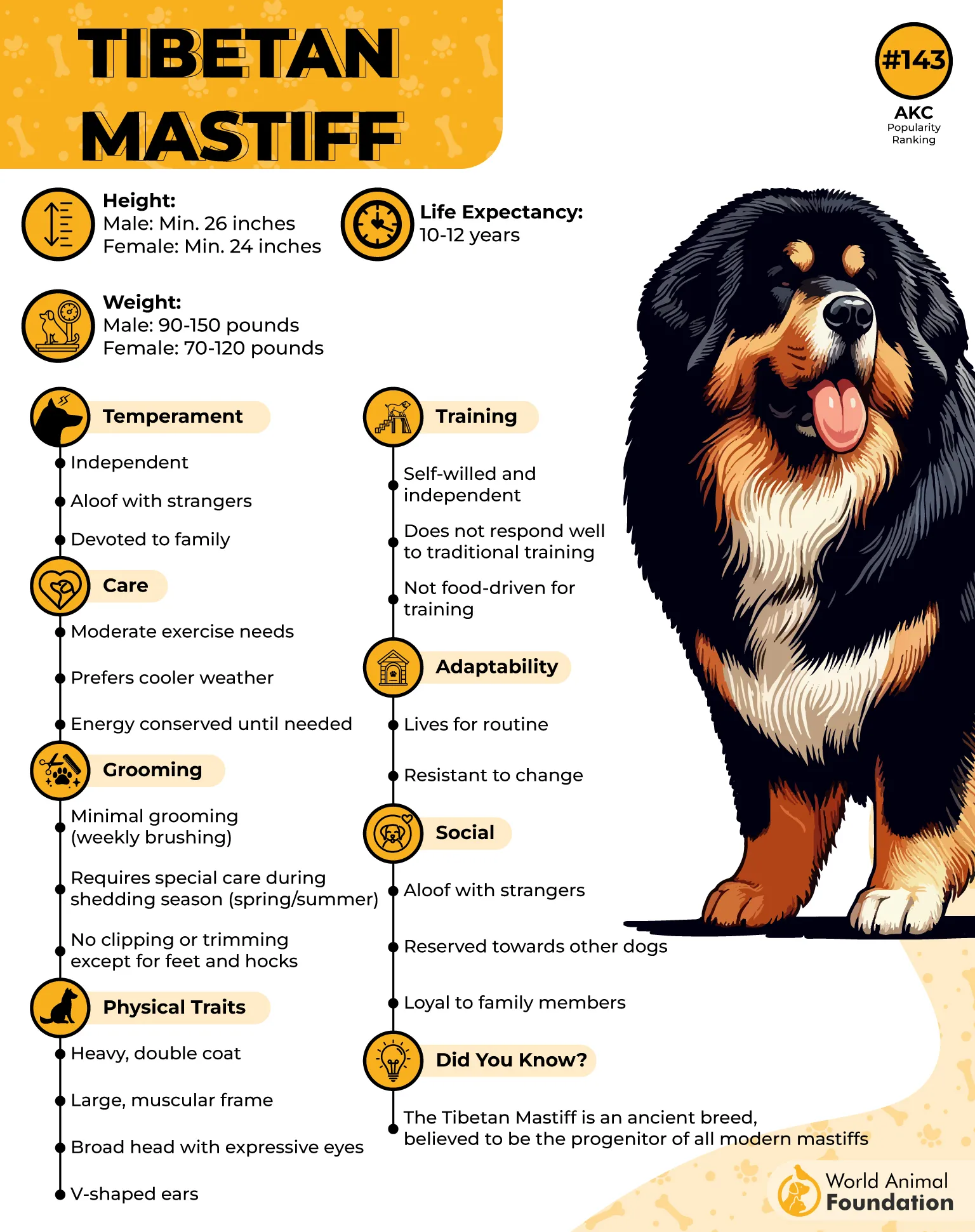
But let’s be real—this dog does not follow orders blindly. Tibetan Mastiffs are famously independent, so they don’t accept new pets into the household without proper introductions. However, once they recognize an animal as part of their “family,” their protective instincts also extend to it.
What makes them particularly good with other pets is their calm confidence. Unlike high-energy guard dogs always on edge, Tibetan Mastiffs have a laid-back nature until they sense an actual threat. They don’t waste energy chasing after smaller animals unless provoked.
That said, their territorial instincts run deep. They need clear leadership and early socialization to understand that not every visitor—or pet—is an intruder. Once they form bonds, though, they’re unwaveringly loyal. This breed won’t just guard your home; they’ll protect every living creature in it.
6. Caucasian Shepherd Dog
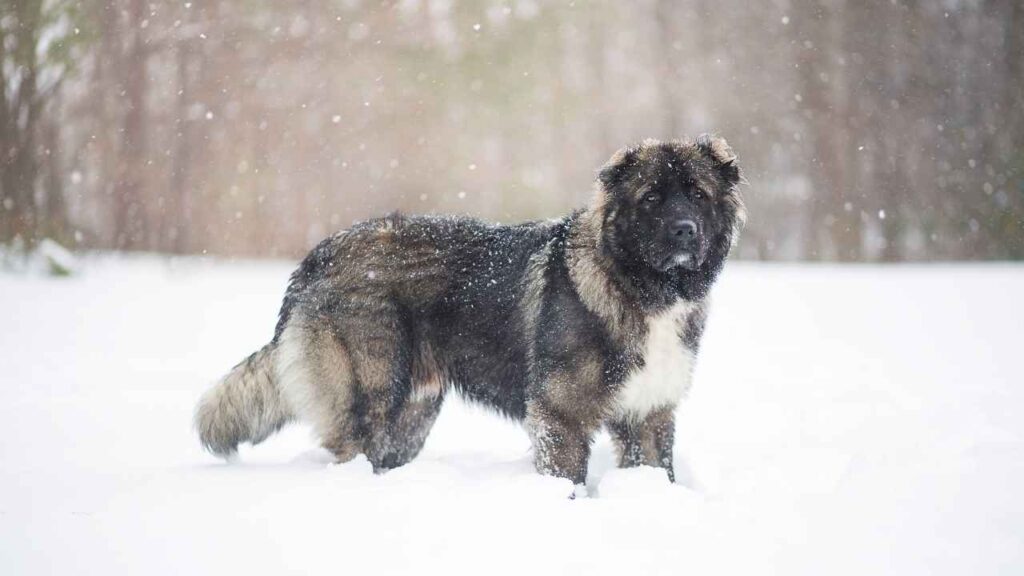
Caucasian Shepherd Dog is a breed built for protection, yet capable of deep affection for those they trust. Developed to defend livestock from wolves and bears in the rugged Caucasus Mountains, this powerhouse protector takes security to the next level. But don’t let their imposing size fool you—they can be surprisingly gentle with their human family and other pets!
Caucasian Shepherds are known for their natural discernment. Unlike guard dogs that react first and think later, these giants assess every situation before deciding how to respond. These excellent protectors don’t become unnecessarily aggressive toward familiar pets.
Their guardian instincts run deep; without proper introductions, they may view unfamiliar animals as intruders. However, when raised with other pets from an early age, they develop a sense of family hierarchy, understanding who belongs and who doesn’t.
According to AKC, Caucasian Shepherds are low-energy dogs that constantly demand stimulation. Instead, they exude a calm confidence, watching everything around them with quiet intensity. This composed demeanor makes them less likely to react to other pets, unless provoked. They won’t chase a cat just for fun, but if they sense a threat, they can handle it.
Size is something to consider. These dogs can weigh well over 100 pounds, and their sheer strength means they can accidentally overwhelm smaller pets if playtime gets too rough. Supervised interactions and gradual introductions help prevent any unintentional intimidation.
7. Appenzeller Sennenhund
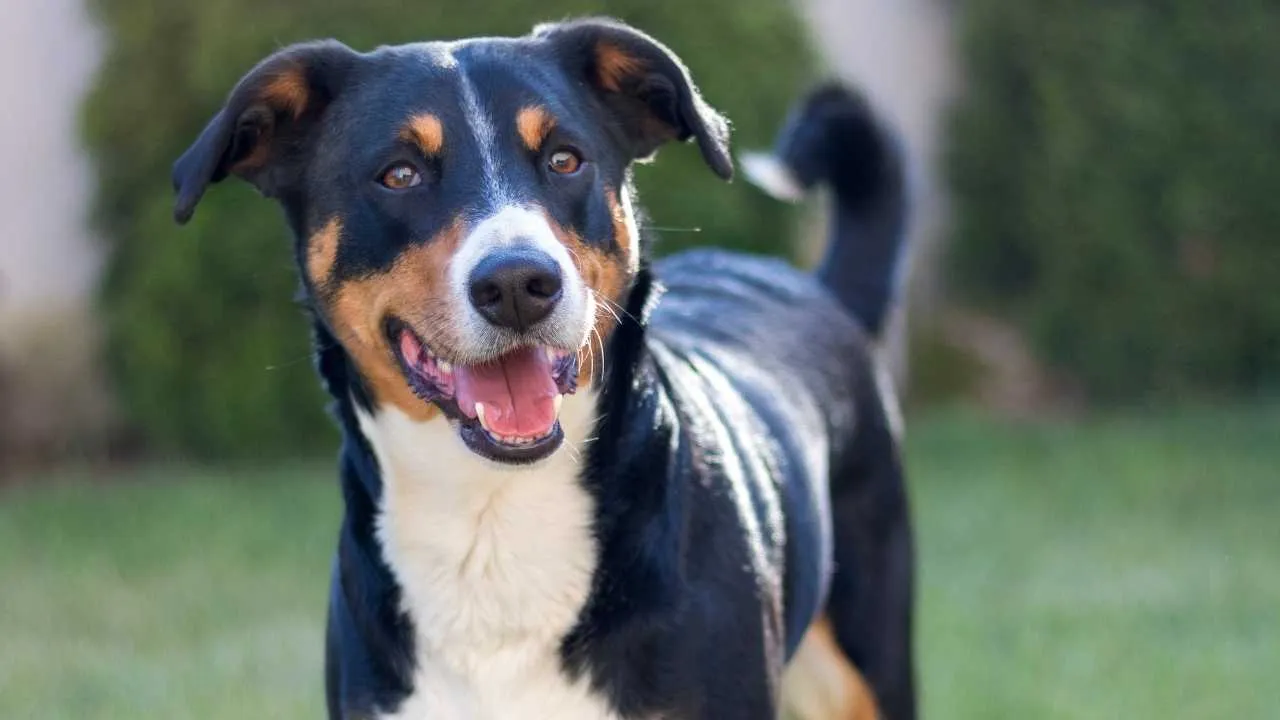
Appenzeller Sennenhund is a high-energy working dog that takes home security seriously while still being fun-loving with its family. Bred to herd cattle and guard Swiss farms, this breed is naturally watchful, highly intelligent, and deeply loyal. Unlike some heavy-duty guard dogs, they’re fast, agile, and always alert.
Appenzellers are highly social when raised in the right environment. They form close bonds with their human family and can extend that affection to other household pets. Whether it’s another dog, a cat, or even livestock, they adapt well as long as they’ve been properly socialized.
That being said, their energy levels are off the charts. This breed needs daily exercise, mental stimulation, and a job to do. Without enough activity, they can become restless, which might lead to unwanted behaviors like excessive barking or trying to “herd” your other pets!
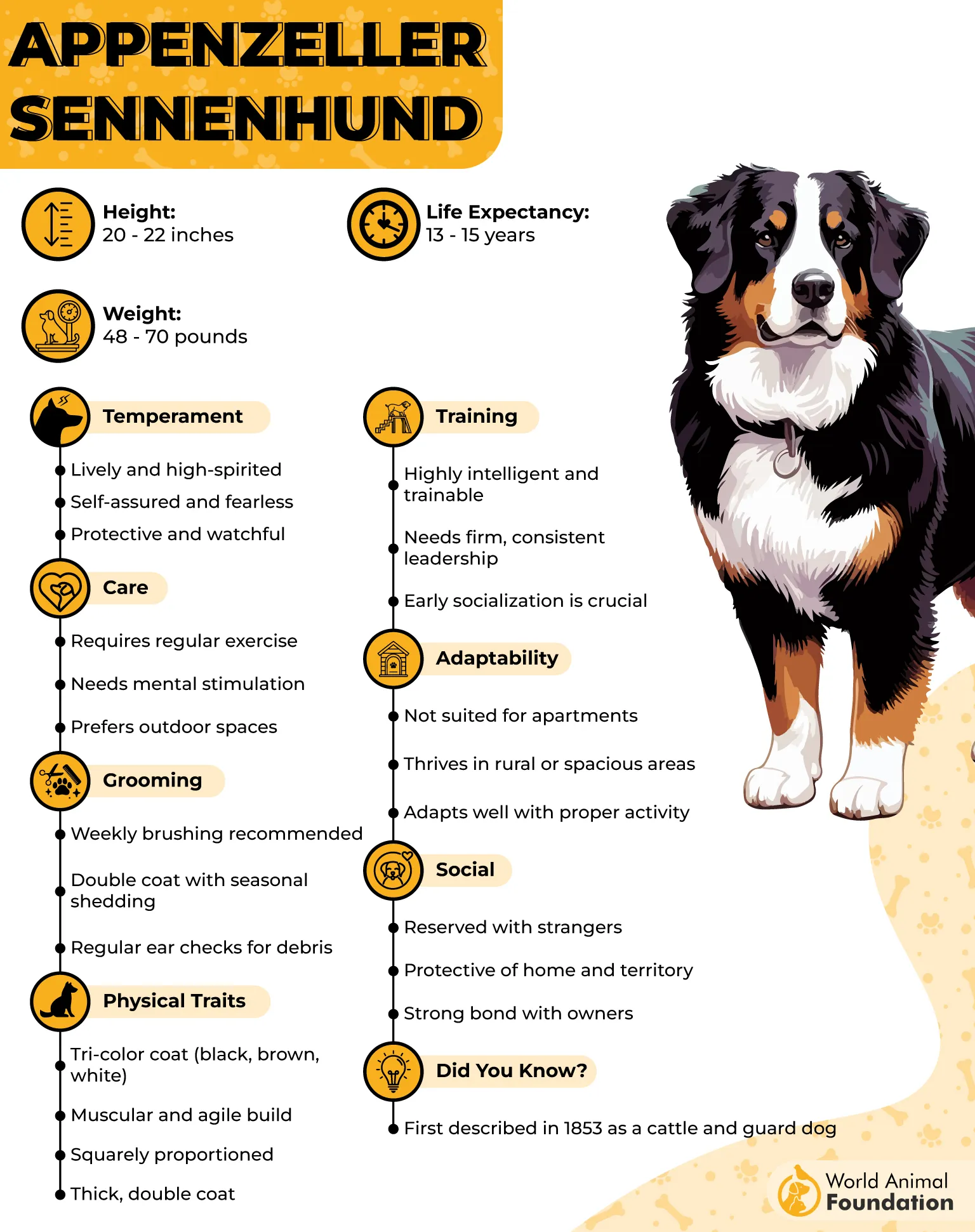
Despite their work-focused nature, they are loyal and have a goofy, affectionate side, says AKC. They love playing with their family and enjoy interactive games. If you have other dogs, they’ll happily engage in friendly wrestling matches, though their high energy might be overwhelming for more laid-back breeds. Early training helps them learn to adjust their play style to match different companions.
Their sharp awareness and intense loyalty truly set them apart as guard dogs. They’re always tuned in to their surroundings, ready to protect their family without hesitation. But unlike some heavy-duty protectors, they’re more agile and quick on their feet, which makes them excellent deterrents.
8. Black Russian Terrier
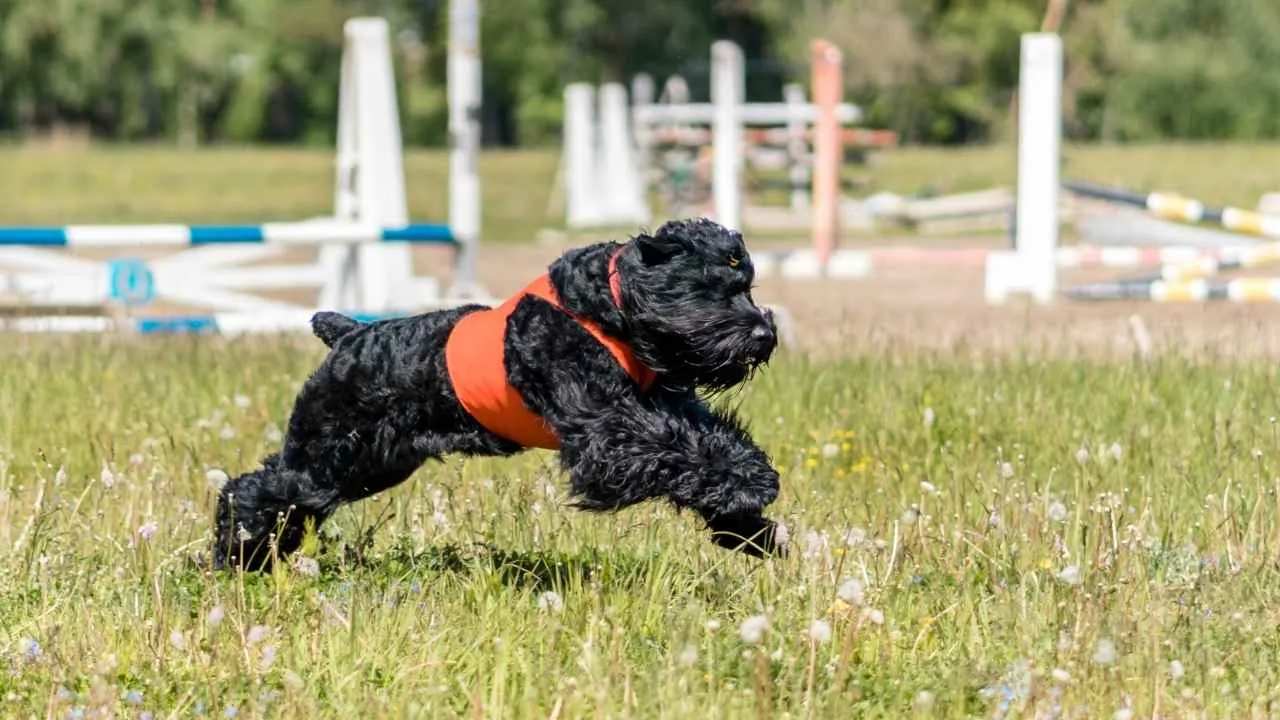
Black Russian Terrier (BRT) is both formidable and deeply loyal. This powerhouse protector was bred for military and security work. Despite their tough exterior, these dogs are gentle giants with their families, forming deep bonds and offering unwavering loyalty. But what makes them stand out? They have a calm, thoughtful approach, always analyzing before taking action.
A well-raised Black Russian Terrier can coexist peacefully with cats, smaller dogs, and even livestock. However, early introductions and structured interactions are key to preventing dominance issues due to their size and strength. Their protective instincts kick in once they understand that another pet belongs to the family.
BRTs have a calm and composed personality. They’re not overly excitable, which means they don’t chase small animals just for fun. However, they are incredibly territorial, so they need to be taught which animals are friends and intruders. With proper guidance, they can be both fierce guardians and gentle companions.
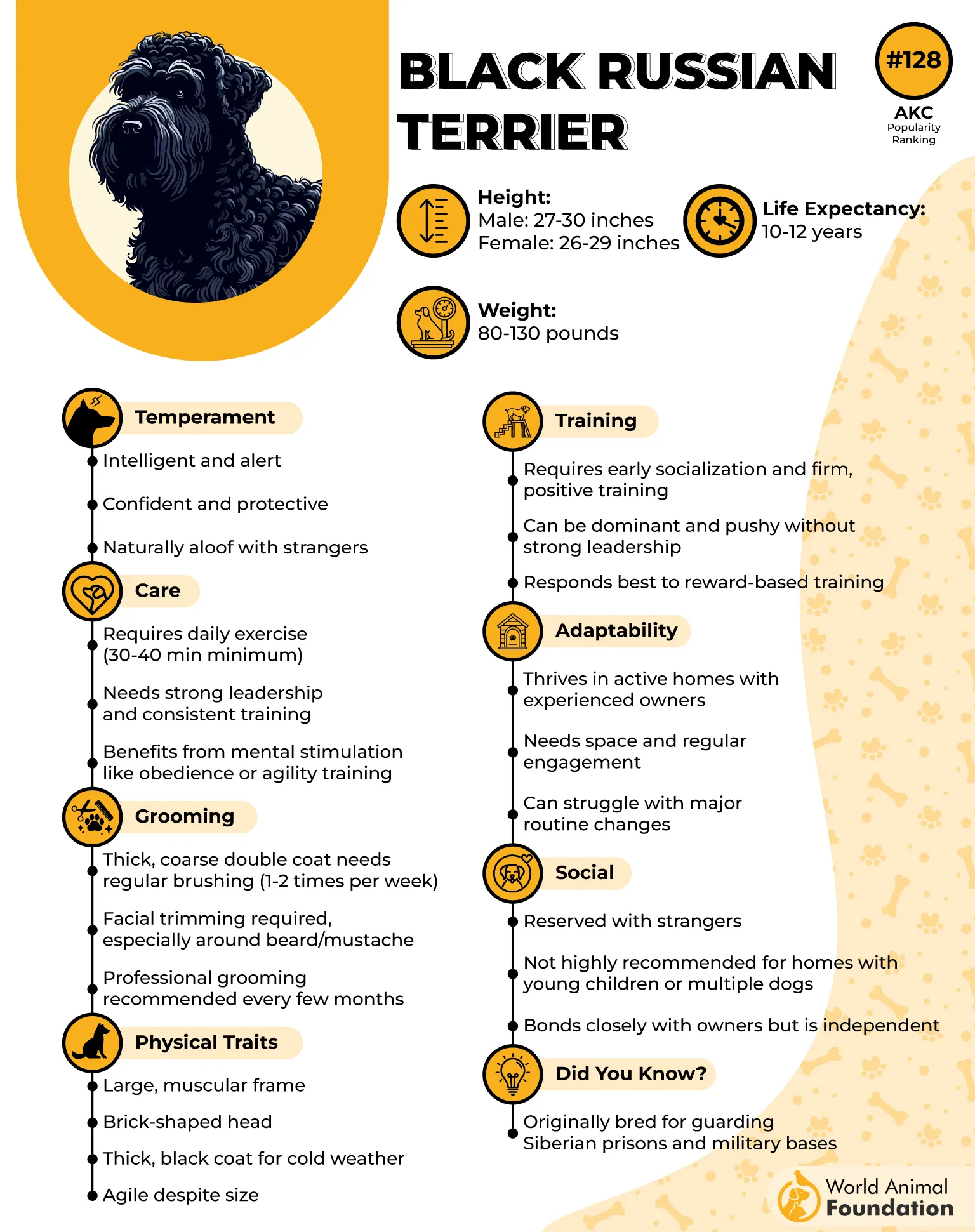
One thing to keep in mind? According to AKC, they’re highly intelligent but also independent thinkers. While they respond well to training, they need a firm and confident handler who can set clear boundaries. Without proper leadership, they might adopt unwanted guarding behaviors.
Despite their strong guarding instincts, they have an affectionate, family-oriented side. They love being around their humans and are known to be surprisingly gentle with children and smaller pets when raised together. While they may not be the most playful breed, they’re incredibly attuned to their family’s emotions, often stepping in when they sense something’s wrong.
9. Boxer
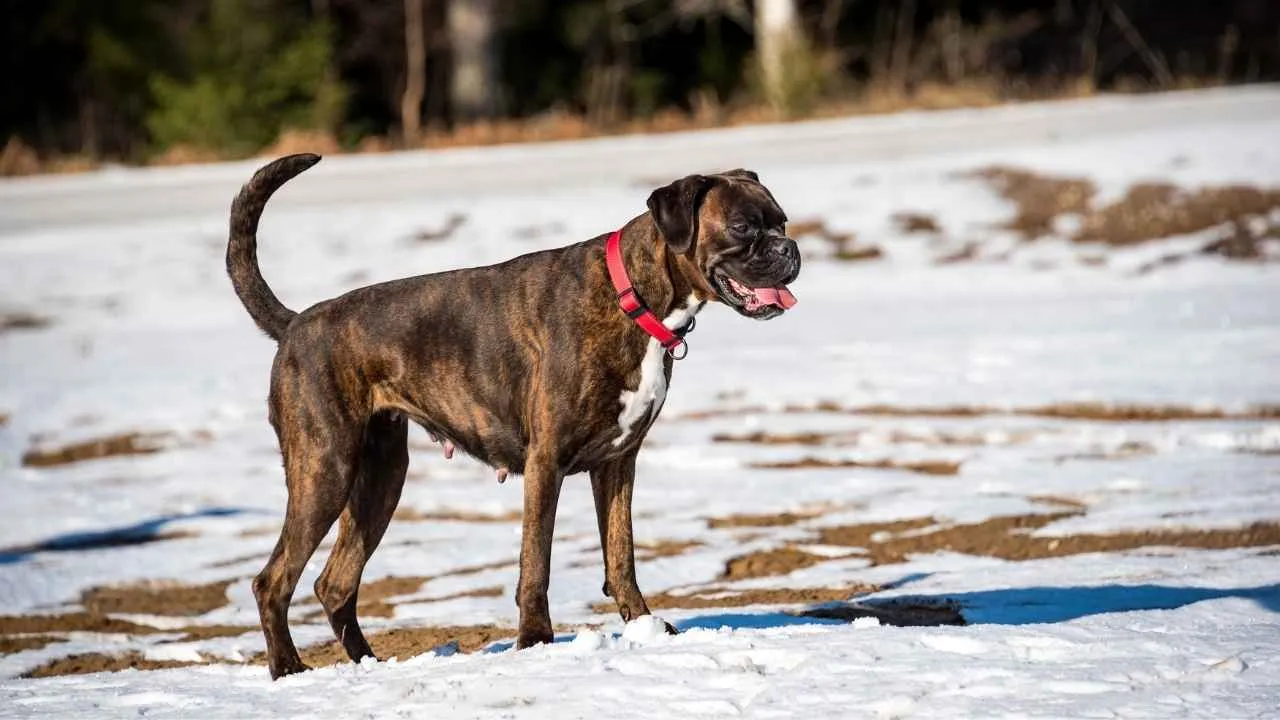
These medium-to-large and muscular dogs may look tough, but they’re total softies with their families, including other pets. While they take their guardian role seriously, they’re also playful, energetic, and incredibly affectionate.
According to Petplan, Boxers are social and friendly, which makes them great for multi-pet households. They’re not the type to immediately assume every stranger (or pet) is a threat, but they’re always on high alert when needed. They can get along with cats, smaller dogs, and even livestock with proper introductions.
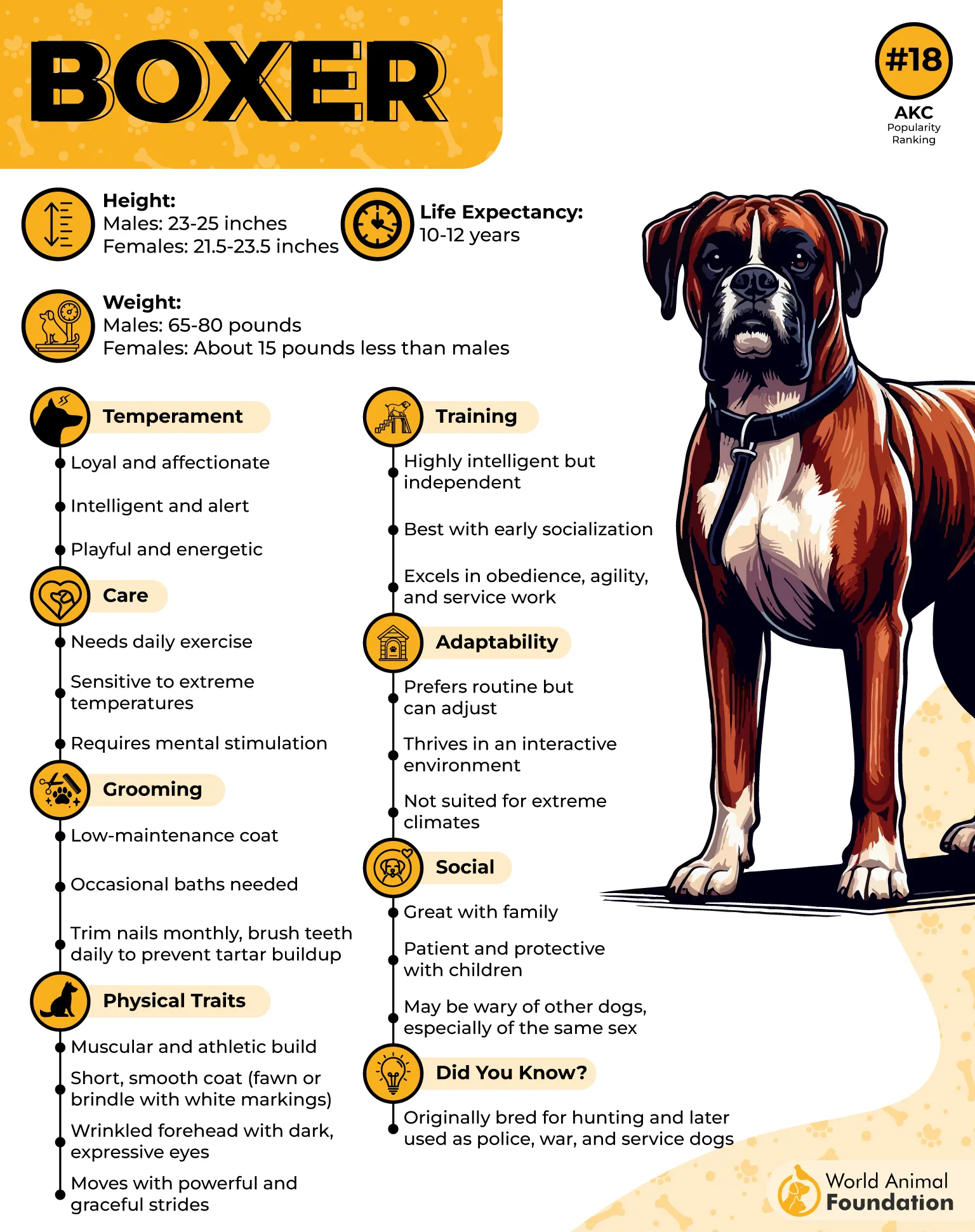
Their energy levels are off the charts. If you have a Boxer, expect nonstop zoomies, playful wrestling matches, and an endless enthusiasm for life. This high energy makes them a great match for active households with other dogs that enjoy a good romp. However, their bouncy nature means they need supervision around smaller pets to ensure they don’t overwhelm them with their excitement.
While they have an independent streak, Boxers are eager to please and thrive on positive reinforcement training. Teaching them to differentiate between threats and normal interactions helps them become reliable protectors without unnecessary aggression. Plus, their expressive faces make those sessions even more fun.
What makes them an excellent guard dog is their fearlessness, combined with their deep connection to their family. They’re naturally wary of strangers, and their imposing stance alone is enough to make an intruder think twice. These dogs don’t act out of blind aggression—they rely on instinct and training to assess situations properly.
10. Cane Corso
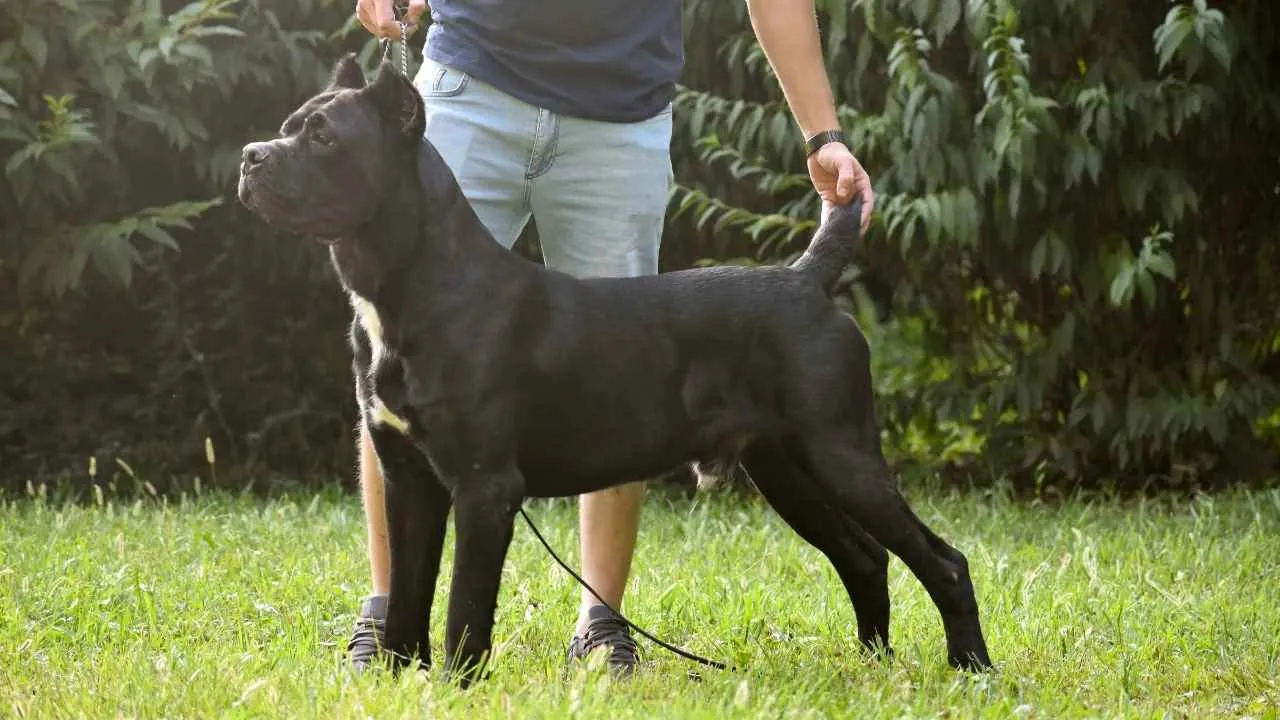
These muscular giants were bred for protection, and they take their job seriously. But here’s the surprise—despite their strong and tough exterior, they’re incredibly affectionate with their family, including other pets, when raised properly.
A Cane Corso isn’t the type to bark excessively or act without reason. Instead, they rely on their intelligence and natural confidence to assess situations before taking action. This makes them an excellent guard dog that doesn’t react impulsively. They learn to distinguish between genuine threats and harmless interactions when introduced early and socialized well.
They won’t tolerate anyone messing with their loved ones, including furry siblings. However, due to their strong guarding nature, early introductions and socialization ensure they coexist peacefully with smaller animals.
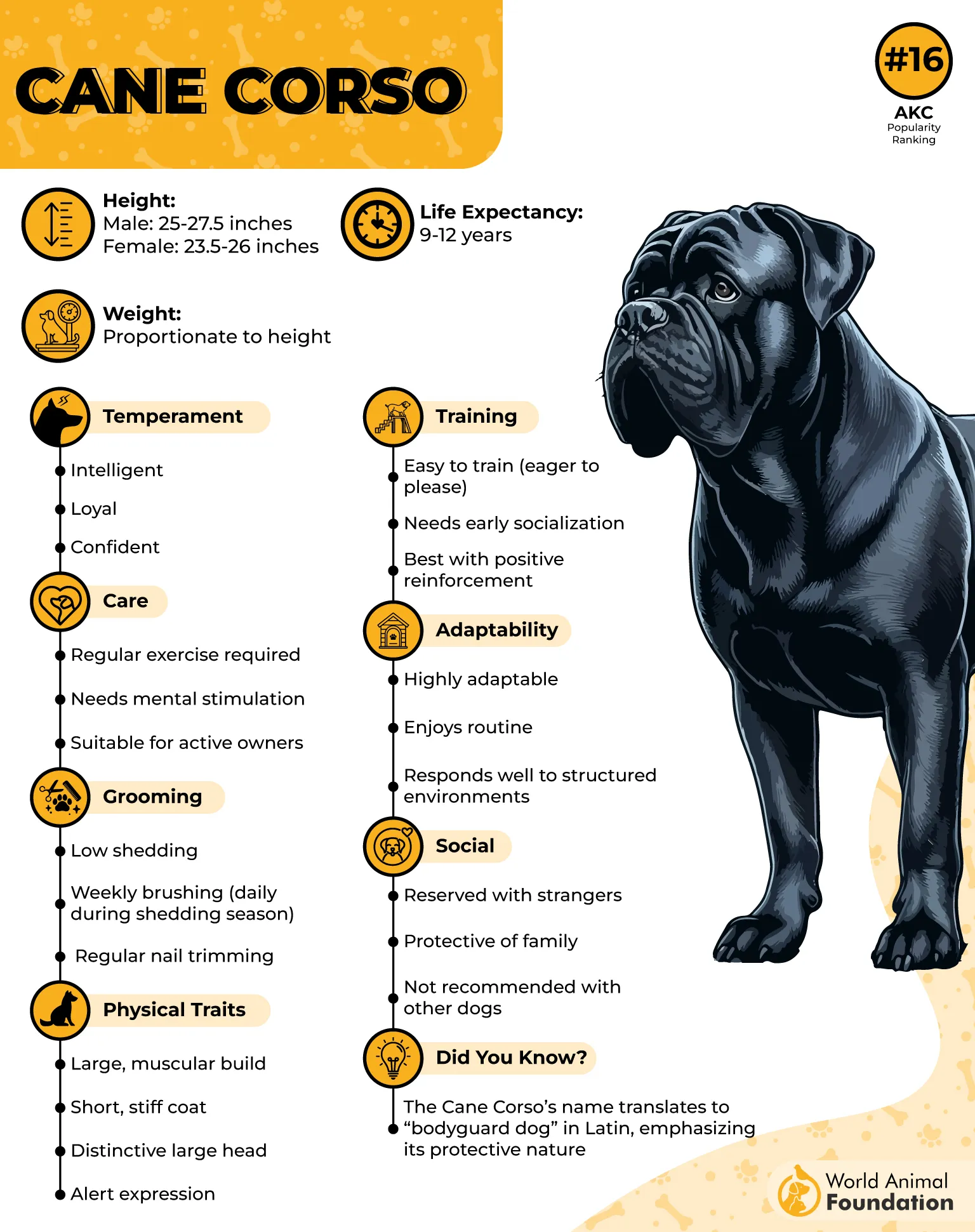
Unlike high-energy breeds that thrive on constant play, the Cane Corso is more about purposeful activity. They love structured exercises like obedience training, agility drills, and advanced protection work. According to PetMD, well-trained Cane Corsos are calm, confident, and composed, making them more likely to interact respectfully with other pets rather than seeing them as competition.
One of the most remarkable things about this breed is its ability to read human emotions. Cane Corsos form deep connections with their owners and have an almost uncanny ability to sense stress, danger, or sadness. This emotional intelligence also extends to their interactions with other pets—if a household animal is unwell or scared, a well-socialized Corso may show a surprising level of care.
Conclusion
When choosing a guard dog that is good with other pets, it’s essential to find dog breeds that balance a protective nature with a family-friendly dog temperament. Many of the best guard dogs have a long history of working as flock guardians and police dogs, making them highly trainable and loyal to their family members while remaining gentle giants around small children and other animals.
German Shepherds, Doberman Pinschers, and Belgian Malinois are known as excellent guard dogs, originally bred for military work and police dog duties. These highly trainable breeds require consistent training to ensure they remain family safe and loving while protecting their house from strangers. Properly trained, they can coexist with family pets, providing security without becoming aggressive toward other dogs.
Some great guard dogs that are more generally calm include the Bernese Mountain Dog, Saint Bernard, and Great Pyrenees, which were originally bred in the Pyrenees Mountains and cold regions, giving them a thick coat and double coat for protection. These gentle giants have a deep bark that helps deter intruders, yet they remain patient and loving toward their family and friends. The Staffordshire Bull Terrier, Giant Schnauzer, and Bullmastiff are excellent watchdogs, displaying a strong-willed nature while remaining affectionate with kids and family pets.


